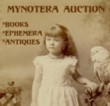|
|
|


|
|

|
Taking Bookselling to the Top
by Craig Stark
#89, 26 February 2007
|
Part IVb: How to Succeed in Bookselling
without Really Trying
Click here for links
to earlier parts of the article.
Most good stories, I think, exhibit almost relentless conflict - continuous episodes of ups and downs, struggles and triumphs (or disasters), which inexorably move to a climax that, when viewed in retrospect, makes perfect sense, even though the outcome may be something that couldn't have been anticipated going in. This story was no exception. When Chris Coover suggested an auction estimate of $50,000 for my album of Ford Theater playbills, well, this was definitely a major up in what had already been a roller coaster ride.
My first thought (surely you know how these things go) was that there was a possibility it could go higher - they can't possibly always get these estimates right - and, if went much higher, the impact on my life could be significant. There's a conversation a scouting friend of mine and I revisit now and again about the impact of a big sale. It goes something like this: "It's always nice to sell something for $5,000 or $10,000, but does it change your life much? Nope. You pay a few bills, maybe buy a new refrigerator, and it's done. Unload something for $100,000 or more, however, and it just might make a difference."
Fortunately, I didn't have much time to dwell on the possibility of a six-figure sale; if I had, it surely would've intensified the disappointment I felt when Chris called a week later with the news that he'd spoken to several Lincoln collectors who suggested a more sobering auction estimate of $20,000 to $30,000. It seemed that the Lincoln market had cooled some and - get this - it turned out that the bad information I'd originally received from my know-nothing acquaintance wasn't totally bad: It did make a difference, and not in my favor, that the playbills were mounted on pages.
As you can imagine, I wasn't thrilled with the news, but it got worse before it got better. During the course of our conversation, he asked me what else I'd purchased from Mrs. Z. I told him about the Lincoln signed Civil War pardon letter I'd sold for $4375 on eBay, then asked if I would've been better off consigning it with Christie's.
"On a good day," he said, "sure, it might have brought $17,000 to $20,000."
Oh, really.
This was getting better by the moment. Then I reminded him about the Grover Cleveland letter I'd asked him about, which he'd neglected to comment on earlier in the process.
No market for Cleveland, he said. A few hundred dollars ... maybe.
Terrific. I guess that baby is going up on eBay.
"Anything else?" he asked.
I was getting depressed. "Nah, just an old legal document, something concerning a business deal Lincoln was involved in about a tavern - and a lawsuit or something. I can't remember. It doesn't have his signature on it."
"Is it dated?"
"1834, I think."
"Whoa."
Whoa?
Yes, whoa. The incident described in this document involved the purchase of a burned tavern by a then youthful Lincoln and a partner, William F. Berry, and a subsequent lawsuit filed by another party when payments on the balance were in arrears. Why was this interesting? Well, it turns out that any Lincoln ephemera prior to his legal career are scarce indeed, and this particular incident had been a topic of considerable ambiguity in more than one Lincoln biography.
You mean this was something that could rewrite history?
A $7,000 to $10,000 possibility that it could do just that!
So, you lose twenty or thirty thou here, get seven to ten thou back there. Easy come, easy go, easy come again. It was quite a ride I was on.
As it happened, by far the longest part of the ride was the one my three sons and I took to New York City shortly before Christmas to attend the album auction at Rockefeller Center. (The legal document had been submitted too late and would be auctioned the following summer.)
As things like this get closer, time has a way of slowing to a crawl. Along the way, of course, the topic of what the album might go for came up more than once, and we decided to do a pool, each of us guessing what the final value would be. One of my sons suggested something over $100,000 (a big dreamer, he), another $25,000, and the third $50,000 - whereas I, being cautiously optimistic, guessed that it would come in at $40,000, although I was secretly wishing for, clinging to the original estimate of $50,000.
Amidst these ups in my thinking were downs as well, moments of "facing reality," one in particular during an extensive rain we encountered in North Carolina, when I prayed that it would just make the stupid reserve we'd set at $20,000. I tried to remind myself that the experience of attending the auction would be reward enough, no matter what happened, especially for my sons, but the chilling possibility that we might have to return home with a no-sale - after this major production - began to prey on me some.
We arrived in Manhattan late afternoon the day before the sale. Our hotel was in mid-town, a few blocks from the Empire State Building, and, after feeding three teenage boys, what's the first thing you do with them on their first trip to the Big Apple? Why, you march them straight to the Empire State Building, of course - where there was good and bad news.
The good news was that almost nobody was there - which, we were told, hardly ever happens - and there was absolutely no waiting for tickets or an elevator. The bad news was that the reason almost nobody was there was that something of a blizzard had developed on the observation deck. Visibility was zero. To his credit, the ticket vendor gave us an opportunity to pass before we purchased our tickets, but heck, why should a little storm stop us? My Florida-grown sons wanted to see snow, perhaps revel in it, and besides, we were looking at nothing more than harmless flurries at street level. How bad could it be?
Well, add 50+ mph winds to harmless flurries, and the experience changes some. After literally leaning hard shoulders into doors just to open them to the observation deck, the four of us were instantly plunged into a tempest. The snow was massively thicker than it had been downstairs, almost horizontal in the wind, and cheek biting in the extreme. They had been right: Visibility was indeed zero.
Two or three minutes into the blizzard, our hands and faces were nearly frozen. We went back inside and made our way to the leeward side of the observation deck. Not surprisingly, the door opened easily this time, and we walked out into a comparatively quiet night, snow now darting wildly from behind, almost instantly swallowed up in the sky. That's when something sort of magical happened: The snow stopped, suddenly, and a sea of glittering lights lay before us.
Moments later, however, shards of scudding clouds were upon us again. The blizzard had returned. Then, moments later it cleared. Back and forth and back and forth the weather changed, and, at one point, I remember watching this all happening and thinking, back and forth, "$50,000," "playbills mounted to album pages," "$50,000," "playbills mounted to album pages ..." Which would it be?
If time had slowed to a crawl up until this point, the next day it all but stopped. It was a gorgeous, sunny day in Manhattan. Visits to St. Patrick's Cathedral, Central Park and the doorway John Lennon was shot in were both interesting and interminable at the same time. Lunchtime came, finally, at Rockefeller Center, where we watched ice skaters from our table. After browsing through displays of auction lots on the first floor, we then climbed a long set of stairs and sat down in the auction room shortly before 2:00 pm. There were 379 lots in the auction, of which mine was #305 - and the afternoon session was scheduled to begin at 2:00 pm with ... #164? It was clear to me that we were in for some serious waiting.
The room was surprisingly small. There were perhaps 100 chairs in front of the podium, less than half of which were occupied and two long counters against each wall manned with Christie's assistants on phones. The crowd seemed thin to me, and I was beginning to sweat it. Worse, it became immediately clear as the auctioneer proceeded through the lots that not everything was meeting reserves - that is, some things were simply going unsold. Wouldn't that be something, I thought again, going home empty-handed.
Slowly, slowly, the lots passed, and I became conscious of a growing sense of dread. More items were going unsold, and, despite the occasional exception, many of them weren't exceeding their estimates by much, though an early copy of the Declaration of Independence did pass $300,000. My boy's mouths dropped open.
Finally, after what seemed hours, the auctioneer reached the group of featured Lincoln items - 14 lots in all, mine the thirteenth. Amongst these were two scraps of ephemera, both signed by Lincoln, which resembled the scrap that had been attached to my Civil War pardon letter. Both went for about $5,000, and I must say that this mitigated my earlier disappointment considerably. Apparently, the eBay sale hadn't been so bad after all. The Lincoln market had indeed cooled. At the same time, I wondered if that bode ill for my album.
Lot #305 came moments later, and a photograph of a playbill featured in the Christie's catalog burst onto the screen next to the auctioneer. Time up until that point had seemed to stand still; now it utterly stunned me how quickly it was all over. It almost seemed unfair, given that I'd waited so many months for this.
In seconds there was a bid from the phones that met the reserve, then four quick bids followed and a gavel: "Boom!"
$31,070.
And the first words out of my mouth were, "Oh, thank God."
I look back on this improbably story now with some bemusement now. Years of experience have intervened, and I'm sure that, if a similar opportunity came up again, I'd handle it with far more aplomb. Nevertheless, it seems that no matter how much more I know now than I did then, there are still those occasions when I put things on top shelves, out of the way, because they seem too ho-hum to bother with at the time, only to rediscover them months or years later, slap myself in the forehead, and mutter, "Good God, Craig. Why on Earth didn't you see that this had value before?" Perception is so much like those intermittent NYC blizzards on top of the Empire State Building, visibility changing by the moment at times, anywhere from zero to 100.
By the way, the Lincoln legal document sold for $5,736 the following year, and when all was said and done, my original $5,500 purchase had netted me over $60,000. This isn't to brag but to make a point that, contrary to conventional thinking, not all of life's lessons arise out of failure; some arise out of success - or dumb luck. Whatever you want to call it!
Want to read more articles by
BookThink's Editor in Chief Craig Stark?
Click
here.
|
|







|
|












|


